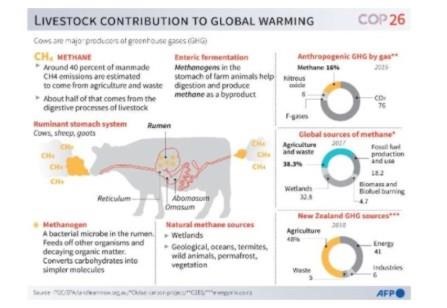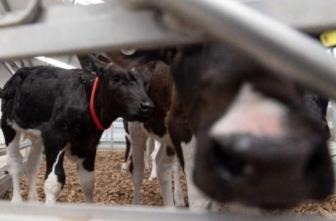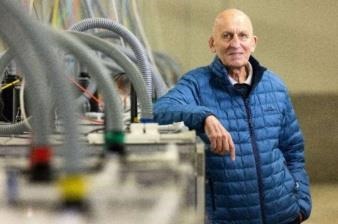Tucked away in rural New Zealand, a multi-million dollar research facility is working to slash the greenhouse gases released into the atmosphere by farm animals—saving the world one belch at a time.
Cattle and sheep are kept in perspex pens for two days per session as scientists carefully analyse every burp and fart that emerges from them at the New Zealand Agricultural Greenhouse Gas Research Centre.
"I never thought I'd make my living measuring the gas that comes out of animals' breath," the facility's director Harry Clark told AFP.
The UN says agricultural livestock accounts for 14.5 percent of all greenhouse gas emissions generated by human activity and the centre—regarded as a world leader in livestock emissions research—is hopeful it can play a key role in tackling the problem.
How authorities ended up funding the project to the tune of NZ$10 million (US$7.0 million) a year is a story of economic necessity and changing attitudes to climate change.
But it begins in the gut of ruminant livestock, which use microbes to partially digest their food by fermenting it in a compartment of their stomach before regurgitating it to be chewed as cud.
The process results in copious amounts of methane—a gas that has more than 80 times the 'global warming potential' of carbon dioxide, across 20 years according to the UN Economic Commission.

There are estimated to be 1.5 billion cows on the planet, with each one capable of producing 500 litres (132 gallons) of the gas each day.
In addition, livestock urine produces nitrous oxide, another powerful climate pollutant.
'Tantalising' methane vaccine'
New Zealand's farm-reliant economy means its proportion of agricultural emissions is much higher, accounting for around half of its greenhouse gases.
At Clark's centre in Palmerston North, the major focus is on livestock methane, which accounts for almost 36 percent of the country's total.
"New Zealand has a specific problem and it's imperative we give farmers the tools and technologies to reduce their emissions," Clark said.
The facility, which is vetted by an ethics committee, is exploring research that includes selective breeding programmes to develop bloodlines of animals that naturally produce less gas.

Sheep have been bred that produce 10 percent less methane than average and Clark said researchers were trying to produce similar results with cattle.
Other projects include putting emission-inhibiting additives in livestock feed and even developing a harness or mask with filters that capture methane before it leaves the animal's mouth.
But Clark said perhaps the most exciting prospect being developed in Palmerston North is a vaccine that reduces methane by targeting the microbes in the gut that produce the gas.
"It's tantalisingly close, in the sense that it works in the laboratory but it doesn't work in the animal yet," he said, adding such a vaccine could be easily administered to flocks and herds worldwide, with an immediate impact on global emissions.
It is a growing area of research globally: In the US, researchers are experimenting with probiotics for cattle, while in India, scientists are adding supplements to feed—with the aim of reducing the amount of methane produced.
But critics warn this approach offers only short term benefits and "band-aid" solutions to major problems.
"Reducing methane output while breeding still more methane-producing animals ignores animal suffering, deforestation, and the increased risk of diseases—including zoonotic viruses—all associated with animal agriculture," said Aleesha Naxakis, spokesperson for People for the Ethical Treatment of Animals (PETA).

Global shift
New Zealand's government has committed to reducing livestock methane 10 percent by 2030 and 24-47 percent by 2050, compared with 2017 levels.
But some have questioned why the lucrative agricultural sector is treated differently to the rest of the economy, which has been set a target of zero net emissions by 2050.
Monitoring website Climate Action Tracker rates New Zealand's climate policies as "highly insufficient", citing the methane carve out as one of the main reasons.
"As we look toward COP26, unless governments take immediate steps to transition our global food system away from animals and towards plants, we're setting fire to the only home we have," warned Naxakis.
Clark conceded 'getting rid of livestock, and eating more plant-based foods' would reduce agricultural emissions and make both people and the planet healthier, but said the situation was more complex.